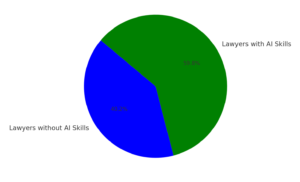The application of AI in legal practices is not only changing the process of legal work but also affecting lawyers’ income as the technology progresses.
A recent study has it that lawyers with AI skills earn almost 49% more than those who do not possess AI skills.
PwC’s report is based on an analysis of more than 500 million job ads across 15 countries in North America, Europe, and Asia.
“Countries and sectors that have a high demand for AI skills tend to see higher wage premiums, especially if there is a scarcity of skilled professionals,” Mehdi Sahneh, senior economist at PwC UK, said in a statement.
Between 2012 and 2023, the number of jobs requiring AI skills grew 3.5 times faster than the total of all jobs across the countries studied, according to the report.
Barret Kupelian, chief economist at PwC UK, also noted that “the menu of skills required by employers in occupations exposed to AI is changing about 25% faster than those which aren’t.”
Here is a pie chart showing the salary distribution for 2023 between lawyers with and without AI skills. According to the data:

Lawyers without AI Skills: Represented in blue, with a baseline salary.
Lawyers with AI Skills: Represented in green, earning 49% more than their non-AI-skilled counterparts.
AI’s journey into the legal sector began with basic tools for document review and legal research. Today, AI technologies, such as machine learning and natural language processing, are streamlining tasks that once required extensive human labor. This trend is growing, with law firms increasingly adopting AI to enhance efficiency and productivity.
This significant wage differential underscores the value placed on technological proficiency in the legal field. For example, lawyers adept at using AI for predictive analytics, contract analysis, and due diligence are in high demand.

Factors Contributing to Higher Wages
Efficiency and Productivity
The use of AI tools can make tasks easier and more precise, thus freeing up the time lawyers spend on such tasks. This efficiency is manifested in increased productivity and, therefore, increased revenue.
Specialization and Expertise
AI skills are developing as a subdiscipline of the legal profession. Legal professionals who can make better use of AI to offer more efficient and accurate legal advice are considered precious to their companies.
Market Demand
It has been noted that there is an increasing need for lawyers to understand and to be able to work with AI. This demand stems from the desire to improve the legal industry and the business benefits that can be achieved through AI.
Wage premiums differ for AI legal professionals in the US and UK, but both locations display sizable variations, as Law360 has reported. In the United States, the wage premium can go as high as 52%, and in the United Kingdom, it is approximately 45%.
The same trend can be observed worldwide. Emerging legal markets in developed countries are now experiencing a high demand for lawyers competent in the use of AI, which indicates that the skill is global and mandatory.
Some of the large law firms like Clifford Chance and Allen & Overy have already incorporated AI into their operation. The firms have revealed that they have been able to record enhanced efficiency and considerable cost reduction, which proves the ROI of AI.
It is empowering for lawyers to learn about AI since it can be a big competitive advantage. Not only do they improve the quality of work done, but they also create new avenues for promotion and advancement to managerial positions in organizations.
AI and technology courses have already started being taught in law schools. This shift makes it possible to produce qualified graduates that will effectively address the changing market demands.
Conclusion
This study establishes that AI competencies are fast becoming a valuable commodity for lawyers, which results in better wages and promotions. With the advancement in technology, the lawyers who accept AI technology will have the opportunity to succeed in this advancing market.

